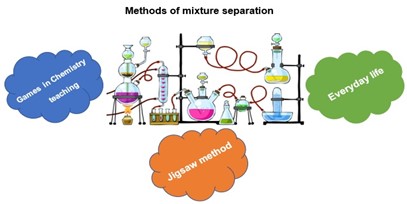Mixtures and Their Separation Methods: The Use of Didactic Games, the Jigsaw Method and Everyday Life as Facilitators to Construct Chemical Knowledge in High School

Published 2021-12-30
Keywords
- Chemistry teaching; Cooperative learning; Pedagogical strategies; Playfulness; IFTM-UDICENTRO
How to Cite
Abstract
One of the difficulties found in Chemistry teaching, mainly in High School, is to establish relations among society, environment, science and technology. It is notorious and has required Chemistry teachers to have certain skills, including some that refer to several situations in everyday life. Therefore, this study aimed at introducing three methodological proposals to teach the content “methods of mixture separation”. The first proposal aimed at addressing concepts and procedures based on different situations found in everyday life. The second offered students some strategies to encourage them to form different points of view and opinions. It favored both intellectual autonomy and access to production of chemical knowledge collectively and collaboratively (the jigsaw method). The third was related to the use of didactic games to make learning easier. The use of games in Chemistry teaching is a methodology that has been used because it enables students to have pleasure and fun while learning. Four classes of freshmen (first year in High School) that attend the Instituto Federal do Triângulo Mineiro - Campus Uberlândia Centro (IFTM-UDICENTRO), located in Uberlândia, MG, Brazil, took part in this study. Results suggest that all methodologies under investigation are also efficient in online lessons. Teachers can use them all together or individually. In addition, the didactic game under study was adapted so that it could be played in online Chemistry lessons, since the world has still been affected by the infectious disease caused by the coronavirus. The adaptation of the game called “SeparaMix” has not been published in the literature yet).
